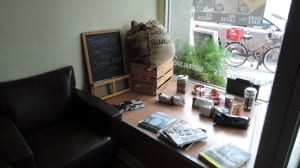Is there a reason to boycott fair trade coffee after reading recent research reports? For me, answer is: No

During a break at a rehearsal that I video recorded on a recent afternoon at The Mod Club, I stopped for a coffee at a nearby fair trade cafe. The coffee was superb, as was the ambience. Jaan Pill photo
I’ve been recently asked, as a follow-up to a recent series of posts about fair trade coffee, if I’m now boycotting this brand of coffee. The answer is: No.
I continue to drink fair trade coffee. I like the taste. And I support local independent businesses, across Toronto, that have built their brand around fair trade coffee. Such cafes typically have great tasting coffee, great staff, and a great atmosphere. Local coffee shops are a great place to hang out, a great place for networking and for having meetings. There’s tremendous value in that.
The fair trade brand – as a brand – is a strong one; it’s easy to sell the brand. That’s one way that independent businesses can grow – by starting with a strong brand.
I’m keen to find out more about poverty, and how I can make a difference
Before I began to read about the back story related to the product, I made a point to buy a lot of fair trade coffee – for example, for brewing at home – simply because I had the understanding that I was helping poor farmers by making such a choice.
For any given local coffee business, it may be the case that the fair trade brand actually matches the back story. I do not have a way, at this point, of ascertaining one way or another.
However, the recent research, which has prompted me to read more widely about the economics and social science of coffee, has served as a wake-up call for me. It’s also given rise to some great conversations.
Changes in my strategy, as a consumer
I will buy a little less free trade coffee than I otherwise would have done. I will buy maybe a little more of other kinds of speciality coffee, that are not part of some fair trade certification program.
I’ve also begun to explore the concept of buying coffee directly – from fair trade coffee producers in Latin America and elsewhere – that are known, on the basis of reliable research reports, to actually improve the lives of poor farmers.
I’ve discussed this topic in a previous post, which refers to several ongoing fair trade projects including the Community Agroecology Network (CAN). According to a footnote in an online book review, “Coffee can also be ordered directly from the [Community Agroecology Network] coop in Costa Rica at this site [see first link in previous sentence]. It may take a while to arrive, but it is very good.”
I’m also doing a lot of reading – about poverty, about ways to address poverty, and about the research related to fair trade coffee. These are fascinating topics.
The experience of drinking a cup of of coffee can serve as a starting point of exploration of many things about the world.
The brand and the back story
There is indeed so much to learn. The brand is easy to understand. The back story requires more work, more time, and more effort. I much enjoy searching for the evidence, as it relates to any topic. The research reports and surveys of the literature are of much interest – as are the strategies that have emerged, and are emerging, that seek to address poverty and extremes of inequality.
The nature of human perception is a related area of interest. Context and framing have much to do with how a topic such as fair trade coffee is understood. Conversations about such topics, under conditions where a wide range of ways of seeing are available, help a person to clarify her or his own views about such topics.
With regard to poverty, I’m much more focused than previously on food security issues right here at home in Toronto. Among other things, I’m keen to learn more about a local Community Garden project that I find very exciting. As well, I’m keen to follow up on what I’ve learned to date about food security issues – and practical ways to address them, here in Toronto. Part of what I know about this aspect of poverty is what I’ve learned as a result of networking with people connected with Jane’s Walk.
Updates
A Huffington Post article, downloaded July 19, 2015, is entitled: The Myth of the Ethical Shopper. We’re still trying to eliminate sweatshops and child labor by buying right. But that’s not how the world works in 2015.
Also of interest: The Rebel Sell: How the Counterculture Became Consumer Culture (2004).
A Jan. 29, 2016 CBC article is entitled: “Coffee cups: 3 months later, are they being recycled at Tim Hortons and Starbucks?”

Leave a Reply
Want to join the discussion?Feel free to contribute!